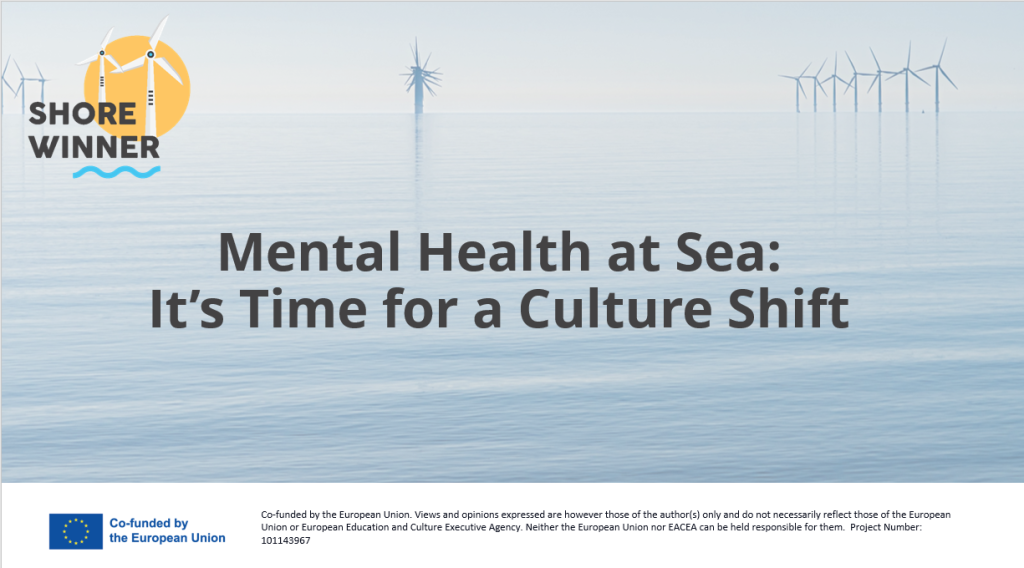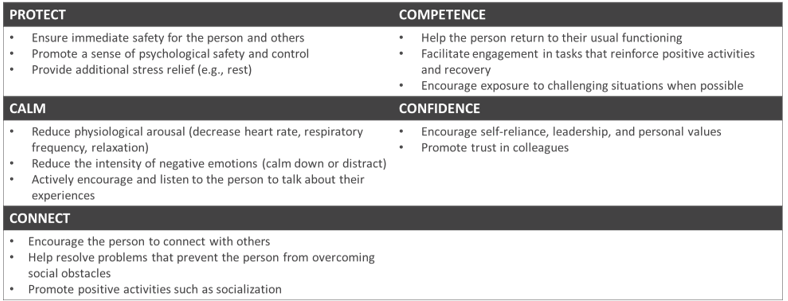Mental Health at Sea: It’s Time for a Culture Shift

Never has it been more urgent to recognize the impact of mental and physical health on ourselves and on those who work alongside us. In the offshore industry, we often speak about Workplace Health and Safety, yet the conversation remains overwhelmingly focused on physical risks. We are trained to prevent falls, respond to fires, and avoid machinery accidents. And while this is crucial, the same cannot yet be said for mental health – an area where the industry still has a long way to go.
Important steps have been taken in recent years, and mental health is no longer a completely taboo subject. Yet, despite increased awareness and some progress, issues like burnout, anxiety, and even suicide remain common across the sector. This cannot continue to be seen as a marginal concern. Mental health must become a clear and collective priority across the industry.
Living and Working Offshore: A Perfect Storm for Mental Strain
The unique nature of offshore work only amplifies these concerns. Statistics show that one in six people will experience a mental health issue in the coming year – and offshore workers face even greater risks due to the specific conditions of their work. Life at sea is demanding and isolating. Workers are often stationed in remote, extreme environments for weeks at a time. They operate under rotating shifts that disrupt sleep cycles and erode the boundaries between professional and personal life. Privacy is scarce, with shared cabins and communal spaces leaving little room for rest or mental decompression. On top of that, the constant awareness of work hazards, adverse weather, and emergency risks adds an ongoing layer of tension.
We must also acknowledge the emotional toll of extended separation from family and community. Offshore work can place immense strain on relationships and personal well-being. While it may be unrealistic to expect the structure of offshore work to change dramatically – long shifts and remote locations are inherent to the job – it is entirely realistic, and absolutely necessary, to ensure that every worker is supported both professionally and emotionally.
Psychological First Aid: A Human Response to Human Struggles
So, where do we begin? Change often starts with those who are physically closest to the problem. In this case, it is the offshore workers themselves – those living and working side by side – who are best positioned to recognize distress in one another and to act. This is where Psychological First Aid (PFA) becomes vital.
Psychological First Aid is not therapy. It is a set of simple, human actions designed to reduce immediate emotional distress and help people feel safe, connected, and supported. It is about knowing how to respond when a colleague shows signs of emotional exhaustion, panic, or overwhelm. In offshore environments, where access to professional mental health services may be delayed or unavailable, PFA becomes an essential peer-to-peer safety tool.
The core principles of Psychological First Aid can be organized into six action areas: Protect, Calm, Connect, Competence, Confidence, and Care – as a foundation for supporting others through stress and crisis.

But psychological safety cannot rely solely on individual awareness. Isolation at sea makes early detection of mental health issues more difficult, which means that responsibility must be collective. Building a supportive environment depends on creating a culture where vulnerability is not seen as weakness but as strength. And that culture must be modelled from the top down.
A Call to Action: Education, Leadership, and Culture Change
Leadership plays a key role. Long-term progress depends on embedding mental health into the training and certification of all offshore professionals. Mental health awareness and PFA must become standard parts of offshore education, not optional extras. Workers need to learn how to identify emotional stressors, recognize the signs of distress and take responsible action. This includes training for managers and supervisors, who must understand how to create psychologically safe environments where people can speak up, ask for help and feel supported.
Fortunately, there are already some promising initiatives underway. A few companies are beginning to incorporate mental health into their Workplace Health and Safety programs. Vocational Education and Training (VET) institutions are exploring modules that address psychological risks in high-stress jobs. Some leadership programs introduce components on emotional intelligence and peer support. But we are still far from a coherent, industry-wide culture of mental health prioritization.
For education and training institutions, the next step is clear: courses must include not only the technical and safety competencies required offshore, but also core knowledge about mental health and prevention. Collaboration between technical disciplines and psychology departments can help ensure that mental well-being is integrated across the board – from university programs to workplace inductions. In addition, research into the psychological impact of offshore work must continue to inform better policies and training models.
Companies also have a duty to act. HR departments, supervisors and team leaders must be equipped with the knowledge and tools to recognize signs of anxiety, depression and isolation. Managers must foster a culture of openness and emotional support, where mental well-being is treated with the same importance as physical safety. Dedicated mental health professionals, namely psychologists trained in prevention and crisis intervention, should be part of the workforce ecosystem, either in-house or through formal partnerships; these services must be accessible and normalized.
Ultimately, the offshore sector needs a cultural transformation. And culture does not shift overnight – it moves gradually, through education, leadership, communication and example. It moves when values are redefined, when vulnerability is accepted and when mental well-being is understood not as a private concern but as a shared responsibility.
In a challenging labour market, mental health services and education can also play a key role in attracting and retaining skilled professionals. Workers today seek more than good pay and technical training; they seek support, stability and purpose. If we want to build a resilient and future-ready offshore workforce, we must build a culture that prioritizes mental health.
So we ask ourselves: Are we truly treating our workers as our most valuable asset? Are we really doing everything we can to create safe, healthy environments offshore? And what kind of legacy do we want to leave for those who will follow?
Vulnerability is our strongest weapon—and the truest measure of courage.

Maria Miguel Rodrigues
Member of the SHOREWINNER consortium
Psychologist (license no. 025882 from Ordem dos Psicólogos Portugueses)
E-mail: maria.rodrigues@inova.business
